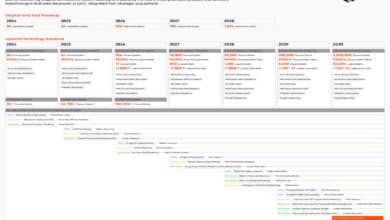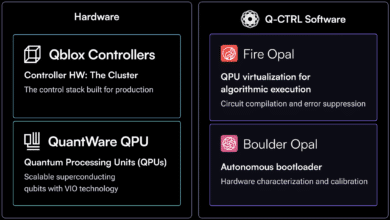UK Unveils Major Quantum Initiatives at 2025 Showcase

8 Nov 2025 – The United Kingdom is ramping up its quantum ambitions with a slate of new initiatives and international partnerships announced at the National Quantum Technologies Showcase in London on November 7. UK officials dubbed the coming years a “Quantum Decade,” backed by fresh investments to maintain the country’s global leadership in the field.
One highlight is a £14 million award for 14 industry-led projects focused on next-generation quantum sensors. These projects, funded through Innovate UK’s Quantum Sensing Mission, span applications from healthcare to transportation. For example, one aims to develop a portable quantum eye scanner to replace bulky hospital machines, another is building a quantum gravity gradiometer to map underground structures like pipes and tunnels without digging. There’s also funding for quantum navigation systems that could guide trains through the London Underground when GPS is unavailable, and quantum-enhanced blood diagnostic tools that use ultra-sensitive measurements for faster cancer screening. These diverse projects illustrate how quantum sensing – leveraging phenomena like atomic interference and entanglement for ultra-precise measurements – could impact everyday life, from reducing NHS backlogs to making trains run on time.
In defense and security, the UK Ministry of Defence is launching a new Quantum Centre for Nuclear Defence and Security at the Atomic Weapons Establishment (AWE). This center of excellence will apply quantum computing and sensing to nuclear security challenges, in collaboration with leading universities (Strathclyde, Oxford, Birmingham). Potentially, that means using quantum sensors to non-invasively evaluate the integrity of nuclear materials or using quantum algorithms to simulate nuclear physics for stockpile stewardship. It’s a sign the UK is integrating quantum tech into its national security apparatus.
Meanwhile, the National Quantum Computing Centre (NQCC) announced that all seven of its prototype quantum computing testbeds are now operational as of 2025. These testbeds – small quantum processors from different UK companies and research groups – were funded with £30 million to give businesses and researchers early access to diverse quantum hardware. Having them operational means UK startups can test algorithms on domestic machines and that promising new technologies (photonics, trapped ions, superconductors, etc.) can be evaluated in a pre-commercial setting. By securing these test platforms, the NQCC is reducing risk for developers and helping “quantum-ready” software and skills grow alongside the hardware.
Internationally, the UK is bolstering alliances. A Memorandum of Understanding with Japan was signed to facilitate joint R&D in quantum computing and exchange of talent between the NQCC and Japan’s AIST. The UK is also reviving a Scotland-California quantum and photonics partnership (SU2P) with £300k in seed funding, linking Scottish universities (Strathclyde, Heriot-Watt, Glasgow, St Andrews) with Stanford and Caltech in the U.S. for collaborative projects. Additionally, the UK helped establish a new metrology network (NMI-Q) among G7 countries plus Australia, to coordinate on quantum standards and measurements – the UK will co-chair its first phase with the U.S. This is about ensuring things like quantum cryptography and quantum sensors have internationally recognized benchmarks, much as we have in classical electrical standards.
Another eye-catching move: together with Canada, the UK launched a £3.5 million joint call to fund quantum communication experiments on the ground and in space. One specific project is SpeQtre, a UK-Singapore satellite mission set to launch on November 10, which will test distributing quantum encryption keys from a satellite down to Earth. By demonstrating space-based QKD, SpeQtre aims to enable ultra-secure global communications, and its imminent launch was highlighted as part of this “quantum showcase” week.
Officials took stock of the past decade of UK quantum investment – over £1 billion since 2014 – and projected the future. They cited analysis that by 2045, quantum technologies could contribute £11 billion to UK GDP and 100,000 jobs. Science Minister Lord Vallance and UKQuantum industry leaders speaking at the event emphasized that the UK’s early start in quantum (with its national programme) has built “considerable strengths” and a thriving startup scene. The announcements at the showcase demonstrate a shift toward translating that R&D into real-world impact – “turning innovation into commercial reality” as one executive put it.
In sum, the 2025 Showcase wasn’t just a science fair; it was a platform for government to roll out concrete support across the quantum spectrum – sensing, computing, skills, security, international – with the aim of keeping the UK at the forefront. The message was clear: the UK views quantum tech as a strategic priority for economic growth and national security, and it’s willing to spend and collaborate to stay in the lead.
Quantum Upside & Quantum Risk - Handled
My company - Applied Quantum - helps governments, enterprises, and investors prepare for both the upside and the risk of quantum technologies. We deliver concise board and investor briefings; demystify quantum computing, sensing, and communications; craft national and corporate strategies to capture advantage; and turn plans into delivery. We help you mitigate the quantum risk by executing crypto‑inventory, crypto‑agility implementation, PQC migration, and broader defenses against the quantum threat. We run vendor due diligence, proof‑of‑value pilots, standards and policy alignment, workforce training, and procurement support, then oversee implementation across your organization. Contact me if you want help.



